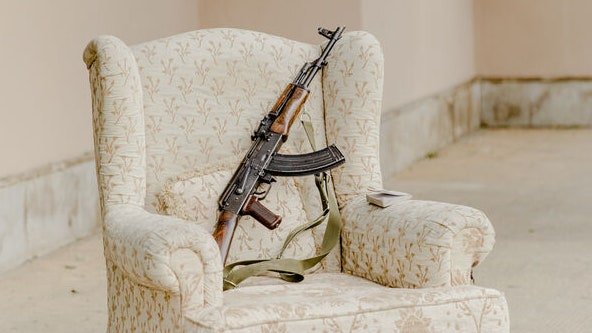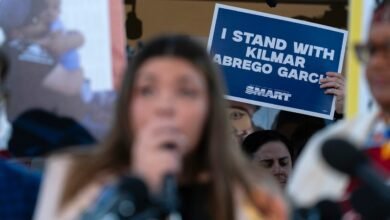
As a first step, Ford told me, the U.S. should begin where it has the most clout: the Kurdish forces who control northeastern Syria. The Kurds, operating under the name Syrian Democratic Forces, have worked closely with U.S. military and intelligence services during a decade of battles to help defeat and contain ISIS. In other words, in the patchwork of foreign-backed proxy forces that are now threatening to carve up Syria or undermine a stable transition, the Kurds are ours. Yet the Syrian Democratic Forces are also linked to a fairly undemocratic Kurdish-nationalist movement. They are an offshoot (if not an arm) of the Kurdistan Workers’ Party, or P.K.K.; the U.S. and European Union have designated that parent organization a terrorist group. The government of Turkey, whose population is about twenty-per-cent Kurdish, considers the P.K.K. an almost existential security threat and insists the American-backed Kurdish forces in Syria are little more than a P.K.K. front. And Turkey is now poised to play a decisive role in Syria’s future. The Turks were a major backer of Hay’at Tahrir al-Sham, and the Turkish intelligence chief, in an apparent victory lap, landed in Damascus just days after Assad fled. Turkey is also the sole sponsor of another Syrian militia, under the misleading name Syrian National Army, which has worked for years to contain the Kurds. Turkish jets started striking Kurdish forces almost as soon as the rebels rolled into Damascus, and the American-backed Kurds and Turkish-backed militias in northern Syria began exchanging fire—an ominous start to the post-Assad era.
Ford, who is now a scholar at the Middle East Institute and stays in close contact with many inside Syria, told me that so far the American message to the Kurds has been “we’ve got your back.” That, in turn, has encouraged the Kurds to “dig in,” push to expand their territory, and resist Turkish demands. Instead, Ford told me, American military and intelligence liaisons should tell the Kurds that “things have changed and this is a time when you need to make some concessions.” He added, “It would be reasonable to ask the new government in Damascus to make some concessions in exchange, and to ask the Turks to make some concessions, but they need to engage in bargaining, to build consensus.” (In a U.S.-brokered deal with Turkey, the Kurdish forces recently withdrew from one predominantly Arab Syrian town, Manbij, which Ford called a hopeful first step.)
Second, Ford told me, U.S. diplomats need to start talking to the many other players now seated at the table—from the Turkish-backed Syrian National Army to small factions like the Dara’a Free Syrian Army to the leaders of Hay’at Tahrir al-Sham, the strongest of the many armed forces now operating in Syria. “If we can’t pick up the phone to the people in Damascus, I don’t know how we are going to deliver any message, because depending on a third party risks misrepresentation of our message, or misrepresentation of the response back,” he said. “We need to be on the ground and engaged with all the actors.”
The conundrum of whether and how the U.S. should deal with Hay’at Tahrir al-Sham has preoccupied public discussion of American policy toward Syria. The group’s current leader, who is best known by his nom de guerre, Abu Mohammed al-Jolani, joined Al Qaeda in Iraq during its insurgency against the U.S. occupation. He spent five years in American military prisons there, and the U.S. is still offering a ten-million-dollar bounty for his capture. But Ford, who first sanctioned Jolani, told me he has been persuaded by accounts that Hay’at Tahrir al-Sham and its leader have become “interestingly pragmatic in a way that they were not in 2012.” The group governed their territory in religiously conservative Idlib with a strong hand toward its political rivals but also with bureaucratic efficiency and, over time, a measure of tolerance, and Jolani has recently opened negotiations with representatives of the Alawites, a religious sect linked to the Assads that Al Qaeda and ISIS had deemed apostate. “That, to me, was shocking, in a positive way,” Ford told me. He noted that Jolani had also welcomed Western assistance in securing chemical weapons supplies left over after Assad’s fall—a move that would be almost unthinkable from a jihadist like Osama bin Laden or Abu Bakr al-Baghdadi. (Jolani has now resumed using his civilian name, Ahmed el-Sharaa.)
The Secretary of State, Antony Blinken, said on Saturday that the U.S. had made “contact” with Hay’at Tahrir al-Sham, signalling that the Biden Administration may be testing that pragmatism. But Dareen Khalifa, an Egyptian senior adviser with the independent International Crisis Group, told me that the U.S. urgently needed to rethink many of its other punitive measures toward Syrian players, as well. She said that after more than a decade of all-out civil war—one that largely pitted Sunni extremists against an Iranian-backed dictator—“the U.S. has imposed a whole web of sanctions and designations on virtually every key actor and every sector in Syria today,” including the institutions of the holdover government. The economic sanctions continue to punish the post-Assad economy. And the terrorist designations of Jolani, Hay’at Tahrir al-Sham, and others cut them off from coöperation or negotiation with Western-friendly Syrian expatriates, who could risk expulsion from their foreign havens. Khalifa urged the Western governments “to put in place waivers or carve-outs for negotiations,” potentially on a contingent six-month basis, so that they could be restored as a penalty for abuses.
Ford warned that the U.S., in opening communication with various unsavory Syrian actors, should learn from its experience in Iraq by adopting both realistic expectations and demands for accountability. “When security forces commit atrocities—which I think is almost a certainty in the case of Syria—we should not just say, ‘Oh no, we told them not to do that!’ We need to say to the commanders, ‘That is not acceptable. When is the trial and when will you announce it?’ And of course it is going to be public, so there is an element of naming and shaming.” If history is any indication, many rebel-militia leaders may now have their eyes on formal positions in a new government—as ministers, members of parliament, or ambassadors, perhaps—giving them an interest in fortifying their own credibility.
And yet Ford acknowledged that the biggest obstacle may be outside Syria’s borders: interference by regional powers, especially the ones who have already sponsored internal factions or conducted military operations—the ones who fuelled more than a decade of war. Restraining such external meddling is the third necessary step. Ford noted that both Iran and Russia, the two open adversaries of the U.S. who were involved in Syria, appear to have pulled back, removing potential obstructions to American input. By far, the two most influential neighbors are Turkey, which backed Hay’at Tahrir al-Sham, and Israel, which indirectly helped push Assad from power by crippling his Iranian-backed allies. Israel has already conducted military operations to destroy much of the remaining Syrian military and occupy what had been a buffer zone in the Golan Heights. Prime Minister Benjamin Netanyahu initially justified those actions as a preëmptive strike to keep weapons and territory out of the hands of Islamist extremists, then issued a triumphant statement from the top of Mt. Hermon, in newly captured Syrian territory, indicating that Israel intended to establish a base there—a step certain to provoke backlash in Damascus and Ankara. Israel has also historically coöperated with Kurdish forces in Iraq, stirring suspicions in Damascus that Israel could now strike an alliance of convenience with the Syrian Kurds.
Ford told me that Turkey and Israel, “the two rising powers” on opposite sides of Syria, “both operate out of a deep sense of moral superiority and historical legitimacy but also acute fear.” To achieve stability, any new Syrian government must guarantee Israel’s security from cross-border attacks by Islamist fighters and guarantee Turkey’s security and territorial integrity against Kurdish separatists. But both Turkey, a member of NATO, and Israel are American allies, putting the U.S. in a position to broker negotiations and urge restraint.
Of all the potential regional spoilers, Ford told me that “the first ones to talk to are the Turks and the Israelis.” Then, he continued, “you also need to talk to the Emiratis and you have to talk to the Saudis and the Jordanians and the Iraqis and the Russians.” Talks with the Iranians would also be useful but require an intermediary, perhaps in Iraq.
Ford spent a day last week answering questions about Syria at the State Department, and there are signs, like Blinken’s comments about making contact with Hay’at Tahrir al-Sham, that the Biden Administration agrees with at least some of his advice. The attitude of the incoming Trump Administration, though, is a wild card. At one point during his first Administration, President-elect Donald Trump sought a full withdrawal of the remaining American forces from Syria as an apparent favor to Turkish President Recep Tayyip Erdoğan, even though Erdoğan was threatening to crush the U.S.’s Kurdish allies if the U.S. troops got out of the way. Pentagon and State Department officials managed to stave off Trump’s avowed withdrawal; Trump’s statements since the takeover of Damascus have suggested he’d still like to wash his hands of Syria and leave it to Turkey. In a social-media post days before the toppling of the Assad regime, Trump showed little interest in any American role in Syria at all, no matter what other players might seek to fill that vacuum. “Syria is a mess, but is not our friend,” he wrote. “THE UNITED STATES SHOULD HAVE NOTHING TO DO WITH IT. THIS IS NOT OUR FIGHT. LET IT PLAY OUT. DO NOT GET INVOLVED!” At a press conference this week, Trump appeared to congratulate Turkey on what he called a relatively bloodless “unfriendly takeover” of the country next door. Yet his strong bond with Netanyahu may yet exert an unpredictable countervailing force on a second Trump Administration.




